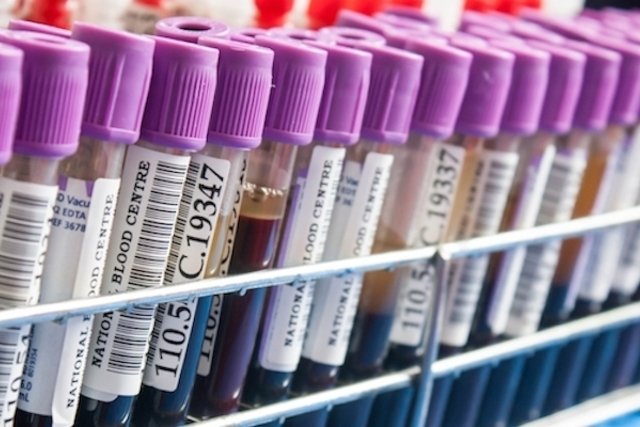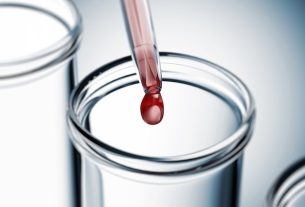Thyroglobulin is a protein produced by the thyroid that participates in the production of thyroid hormones. Thus, the thyroglobulin test may be indicated to evaluate the response of thyroid cancer to treatment and identify its return after removal of the gland by surgery.
However, changes in thyroglobulin levels in the blood are not always indicative of cancer and may also be present in the case of other thyroid problems, such as hyperthyroidism and thyroiditis.
In case of changes in thyroglobulin levels in the blood, it is recommended to consult an endocrinologist or general practitioner for an evaluation and to identify whether there is a thyroid problem that requires treatment.

What is the thyroglobulin test for?
The thyroglobulin test is indicated for:
- Assess response to thyroid cancer treatmentespecially if the gland has been removed;
- Identify the return of thyroid cancer after removal of the gland by surgerywhich can be used as a form of monitoring after treatment;
- Assist in the diagnosis of factitious thyrotoxicosiswhich is excess thyroid hormones in the circulation due to medications such as levothyroxine.
Furthermore, in case of thyroid cancer, thyroglobulin levels in the blood can also be indicative of disease activity, as the amount of thyroglobulin in the circulation is proportional to the functioning of the gland and its size. Find out about other tests that evaluate the thyroid.
What is the relationship between anti-thyroglobulin and thyroglobulin?
Anti-thyroglobulin is the antibody produced by the body against thyroglobulin and, sometimes, its identification in the blood can be indicative of autoimmune thyroid diseases, such as Hashimoto’s thyroiditis and Graves’ disease. See more about anti-thyroglobulin.
How is the thyroglobulin test done?
The thyroglobulin test is carried out by collecting a small blood sample that is sent to the laboratory for analysis.
In most cases, no type of preparation is necessary, but depending on the technique used to perform the exam, some laboratories may recommend that you stop taking some vitamin supplements, such as those containing vitamin B7, for at least 12 hours before of the exam, as it may interfere with the result.
What does the result mean
The thyroglobulin reference value may vary depending on the laboratory and detection method used. In general, it is considered that the reference value for the thyroglobulin test is between 3.5 and 77 ng/mL.
High thyroglobulin
The main causes of high thyroglobulin are:
- Use of antithyroid medicationssuch as methimazole or propylthiouracil;
- Hyperthyroidismdue to excessive thyroid stimulation;
- Thyroiditiswhich is inflammation of the gland;
- Thyroid traumain the case of surgery or biopsy, for example;
- Chronic kidney diseasewhich affects the functioning of the kidneys to eliminate substances from the body;
- pituitary adenomaif it causes excessive production of TSH;
- Thyroid cancerand may also indicate metastasis or persistence of parts of the tumor after removal of the gland by surgery.
Although thyroglobulin is high in cases of thyroid cancer, this test is not used to confirm the diagnosis, and other tests, such as a biopsy, are necessary to identify the tumor. See the symptoms of thyroid cancer and how to confirm the diagnosis.
Low thyreoglobulin
In general, a decrease in thyroglobulin levels means that the thyroid is functioning normally. Furthermore, it may be a consequence of the use of thyroid hormones in high doses or the removal of the thyroid gland through surgery.
However, in the case of thyroid cancer where the gland is removed, thyroglobulin levels are expected to be undetectable. Therefore, in this case, even if the levels are low, they may be indicative of the disease returning.
Bibliography
- MAYO CLINIC LABORATORIES. Thyroglobulin, Tumor Marker, Serum. Available at: <https://endocrinology.testcatalog.org/show/HTG2>. Accessed on 05 Jun 2023
- VAISMAN, Fernanda. Serum positive thyroglobulin antibodies: an old problem with new questions. Arch. Endocrinol. Metab. Vol.61, n.2. 2017
- WEISS, Roy. AND; REFETOFF, Samuel. Chapter 78 – Thyroid Function Testing. In: Endocrinology: Adult and Pediatric Endocrinology: Adult and Pediatric. 7.ed. Elsevier Inc, 2016. 1350-1398.
- STATPEARLS. Physiology, Thyroid Hormone. 2023. Available at: <https://www.ncbi.nlm.nih.gov/books/NBK500006/>. Accessed on 05 Jun 2023
- COSCIA, Francesca et al. The structure of human thyroglobulin. Nature. Vol.578, n.7796. 627–630, 2020
- INDRASENA, Buddhike SH Use of thyroglobulin as a tumour marker. World J Biol Chem. Vol.8, n.1. 81–85, 2017

Sign up for our newsletter and stay up to date with exclusive news
that can transform your routine!
Warning: Undefined array key "title" in /home/storelat/public_html/wp-content/plugins/link-whisper-premium/templates/frontend/related-posts.php on line 12
Warning: Undefined array key "title_tag" in /home/storelat/public_html/wp-content/plugins/link-whisper-premium/templates/frontend/related-posts.php on line 13



